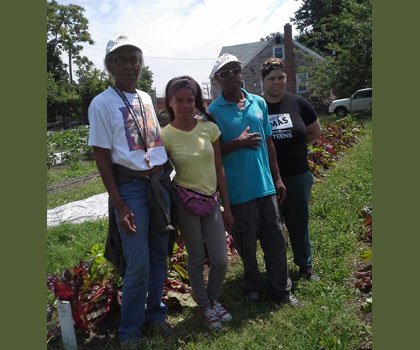BALTIMORE — Just at the southernmost point of Baltimore City is the community of Cherry Hill. The area is home to mostly low-income families, many headed by single parents.
Juanita Ewell is an integral part of the success of the Cherry Hill Urban Garden. For the past four years, Ewell and a small team have worked diligently in the garden encouraging its growth.
After World War II, many veterans moved to this segregated community, to homes built especially for returning veterans. There were private homes, apartments and public housing units.
The saving grace of the community was its self-containment: grocery stores, doctors’ offices, schools, recreation centers, a movie theater, swimming pools and churches— all within walking distance from any home in the area.
Generations of families lived nearby and teachers sometimes taught the children of some of the parents. Cherry Hill was a very close-knit community.
Now, it’s not so much the case. Older families have moved away, giving way to young parents. There is a lack of recreational facilities in the area and unemployment in the area is among the highest in the city.
The Cherry Hill Community Development Corp. has worked tirelessly to tackle and combat the problems— one by one— with one obvious success: The Cherry Hill Urban Garden.
According to long-time resident, Juanita Ewell, “Cherry Hill has become a ‘fresh food’ desert. There are at least six carryouts in the area, but no supermarket. One can buy chicken boxes, Chinese food, submarine sandwiches, but not fresh food.”
This glut of fast-food establishments provides “sustenance” of sorts.
It’s sort of a catch-22, Ewell continued. “Many of the residents get monthly checks and patronize these stores. The families eat what they can, because they can’t get to a market to buy fresh food,” she said.
This wasn’t always the case. There was always a supermarket in the shopping center. At one time, Catholic Charities bought into the shopping center and encouraged a supermarket to move there. That market has been gone for years. In its place— a dollar store.
“Many of the residents don’t drive and the nearest supermarket is two miles away. So, for those who want, they either have to catch public transportation or pay someone to take them to the market and bring them back. A hardship when you’re living on a fixed income,” Ewell said.
Ewell is a retired state employee who has always planted food for her family in her own back yard. So, the idea of starting a vegetable garden to benefit the community wasn’t much of a stretch.
“I found after I retired that I wanted to contribute to the community,” Ewell said. “So, the community organization took on the problems they deemed the most critical; housing, fresh food and recreation. The idea of a community garden came out of those meetings.”
The next step was to find a place for the garden in an area that would be accessible to all the residents.
It was decided that a nearly two-acre site off Cherry Hill Road would be the ideal place to build the garden. The lot was already vacant; public housing units had been demolished some 15 years earlier. In the place of these units was an overgrown field covered with brush, trees and trash.
The lot belongs to the Housing Authority of Baltimore City (HABC), who had to be petitioned for permission to use the lot.
“We don’t have to pay to use the lot, but we do have to apply yearly,” Ewell said.
Ewell and other volunteers rolled up their sleeves and took on the job of turning the lot into a thriving vegetable garden.
“It took a year to clear this lot. That meant cutting down trees, hauling away trash, all without the use of heavy machinery. My team and I used hand tools and sweat, but we finally got the lot cleared,” she said.
Ewell’s “team” comprises volunteers— some college students, a neighbor and a few other young people.
In spite of the “bad press” the community has received, Ewell says there are a lot of good going on in Cherry Hill.
“There are at least 12 churches here. Our children have gotten involved in recycling and
neighborhood clean up projects,” she said.
As for the garden itself, all of the vegetables are grown without pesticides or chemicals.
“We make our own compost, nothing goes to waste,” Ewell said. The growing season is on going, well into late fall.
After the growing season, the garden is open for vegetables to be gleaned by the residents.
For four years, Ewell and her small team have worked diligently in the garden encouraging its growth.
“We’re out here six days a week,” she said. “Our mission is simple— to bring food to a ‘food desert’ and to teach residents how to eat healthy.”
The vegetables are only sold on Saturdays because it’s hard to tend to the garden and wait on customers with such a small staff, according to Ewell.
In addition to vegetables, the garden will eventually offer fresh fruit. There are apple, peach, cherry and fig trees on the site, which Ewell says will start producing fruit sometime next year.
The garden is a non-profit, but sells its vegetables in order to buy more seed.
“Eventually the money we make will go into community non-profits— agencies that work to improve the quality of life for Cherry Hill residents,” Ewell said.
The Garden is always looking for volunteers, especially within the community.
“This garden is for the community. I would like to see more of the community involved in its success,” Ewell concluded.
For more information about the Cherry Hill Community Garden, call Juanita Ewell at 410-355-1020.

